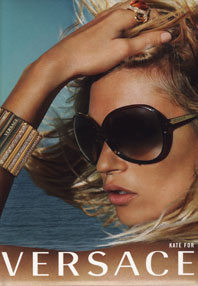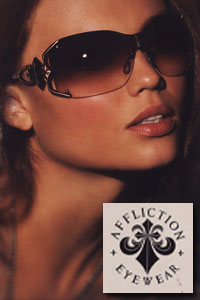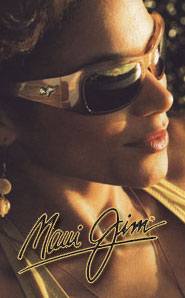|
Sun Glasses
 Learn more about: Learn more about:
Sun Lenses
Protection
Performance
Choosing Sunwear
Care Tips
FAQs
Aside from protecting your eyes from harmful UV
rays, sunglasses satisfy the fashion and lifestyle needs for all.
From high-fashion to sporty and anywhere in between, sunwear today
offers a variety of options for you to choose from.
What
we wear, including our sunglasses, speaks volumes about who we
are. In fact, the average person owns multiple pairs of sunglasses
which projects their sense of style and personality. What do your
sunglasses say about you?
|
Sun Lenses
 Polarized lenses: are the top pick for eliminating
glare. Hunters, boaters and fishermen, golfers and driver are
a few who benefit from polarized lens' glare-cutting properties.
Any surface can create glade in sunlight, including water, sand,
snow, windows, vehicles and buildings. Polarization eases eye
stress and fatigue in the sun, and it comes in several color and
density options. Polarized lenses: are the top pick for eliminating
glare. Hunters, boaters and fishermen, golfers and driver are
a few who benefit from polarized lens' glare-cutting properties.
Any surface can create glade in sunlight, including water, sand,
snow, windows, vehicles and buildings. Polarization eases eye
stress and fatigue in the sun, and it comes in several color and
density options.
Tinted Lenses: the majority of lenses can be
tinted from light to very dark. Tints from sun lenses are usually
medium to dark shades, and can be solid thorough the whole lens,
or gradient, darker on top fading to lighter or clear at the bottom
of the lens. Tints also come in a rainbow of color options.
Mirrored Lenses: not only look cool, they are
cool. Mirrored coatings provide a reflective surface that makes
the eye virtually invisible to viewers, while keeping the wearers
eye protected from glare and heat. Mirrors come in a variety of
colors to enhance tints and visual performance.

top of page |
| Protection Every day - whether it is sunny or cloudy, and despite the season
- we are exposed to ultraviolet (UV) radiation from the sun. Most
of the time we don't even realize it, considering UV rays are
invisible to the eye. However, just as sun can damage your skin
(burning, wrinkling, skin cancer and premature aging) it can be
just as nasty on your eyes.
Unprotected exposure over long periods of time can, and often
does, damage the eye. This exposure can greatly increase the chances
of catar acts, age-related macular degeneration and glaucoma. These
conditions can seriously impair vision and are usually impossible
to reverse. acts, age-related macular degeneration and glaucoma. These
conditions can seriously impair vision and are usually impossible
to reverse.
Fortunately, vision damage can be prevented by shading your
eyes from UV rays. Wearing sunglasses with 100 percent UV protection
can significantly reduce the risk of vision problems caused by
sunlight. Wrap-around frames and large lenses can also help to
provide an extra measure of protection.
The sun’s glare can also pose a risk to ones health, severely
affecting visual acuity and comfort. There are four levels of
glare:
- Distracting glare caused by lens reflections. This is usually a minor annoyance, but can also result in eye fatigue.
- Discomforting glare caused by bright lights. This type of glare also results in eye fatigue, often as a result of constant squinting.
- Disabling glare caused by excessive, intense light, which blocks vision.
- Blinding glare caused by reflections from smooth surfaces, such as roads, water or snow. Blinding glare can be dangerous as it blocks vision in critical situations (i.e. driving or skiing)
Luckily, there are multiple ways to reduce glare, including anti-reflective lenses, fixed-tint lenses or polarized lenses. For more information on these glare protection options, please click here.
Aside from the important function of guarding the eyes from sun-related
eye diseases and harmful glare, sunwear can also provide a variety
of comfort and vision benefits, such as:
- Protecting the eyes from wind, dust and pollen
- Helping to comfort dry eyes
- Preserving good night vision (when worn during the day and not at night)
- Enhancing contrast
- Reducing tearing and squinting
And don't forget about the kids! You wouldn't send your children
to the beach without sunscreen, so don't send them without sunglasses
either. Children's developing eyes let in more UV rays than adults';
and since children tend to spend a majority of their time outdoors,
sunglasses with the most impact-resistant lenses ar a must for
all kids.
Remember, EVERYONE is at risk for UV-related eye damage!
Visit your eyecare professional for the best protection for your
eyes while in the sun. To learn more about UV protection, visit
www.checkyearly.com.
top of page |
|  Different lifestyles, occupations, and activities require
different lenses and frame features. Matching your unique lifestyle
needs with the right kind of eyewear can not only increase comfort
and protect your vision, but it can also enhance your performance. Different lifestyles, occupations, and activities require
different lenses and frame features. Matching your unique lifestyle
needs with the right kind of eyewear can not only increase comfort
and protect your vision, but it can also enhance your performance.
Constant advances in technology and style options can give
you a competitive edge that will help you to see better and look
great. There has never been a better time to build an eyewear
wardrobe that suits your personality and lifestyle, and enables
you to always be on top of your game - whether at work or at play.
Consider the following options when selecting the perfect
sunwear lenses for your lifestyle:
Photochromic Lenses: These changeable lenses automatically
darken and lighten to provide the right level of protection and
comfort over a whide range of light conditions.
Polarized Lenses: Polarized lenses work exceptionally well to
filter out reflected glare from shiny surfaces like water, pavement
and dashboards. They improve contrast and visibility while reducing
squint and eyestrain.
Impact Resistant Lenses: All sunglasses in the U.S. must meet
FDA impact requirements. Until recently the only lens material
recommended for high impact or competitive sport use was polycarbonate.
Now there are new high strength lens materials, including polyurethance,
which bring new performance options.
Tints: Certain tints that control the amount and type of light
that reaches the eye can improve performance by enhancing contrast,
colors and visibility. Click here for popular tint options.
Anti-reflective Lenses: These lenses dramatically reduce distracting
reflections, improving contrast, visual acuity and comfort in
difficult lighting situations.
 There are a wide variety of frame materials which can impact performance,
durability and comfort such as titanium, memory metals, stainless
steel and numerous high-tech options in “plastic.” Style features such as: There are a wide variety of frame materials which can impact performance,
durability and comfort such as titanium, memory metals, stainless
steel and numerous high-tech options in “plastic.” Style features such as:
- non-slip bridges
- gripper temples
- spring
hinges
- shields
- wraps
- venting systems
add value and comfort
and pump up your performance at the same time. Sun clips and sunwear
that fits directly over prescription eyewear are also available
to meet specific needs. Talk to your eyecare professional for
recommendations on sunwear that fits your lifestyle.
For more information on eyewear for specific sports sunwear,
please click here.
top of page |
| Quality is largely a personal issue. Depending on whom you ask,
quality sunwear may mean high performance, uncompromised protection
or a brand name. According to the Sunglass Association of America,
the ‘best’ sunglass is the one which you will actually
WANT to wear most of the time when outdoors, especially in the
sun. Ultimately, what you want to get out of your sunwear will
determine what you consider high quality.
There are some key elements of sunwear that can factor into
quality no matter what your personal preference, including:
- Flexibility
- Durability
- Comfort
- Visual acuity
- The ability for the sunwear to remain adjusted for a reasonable
amount of time
- 100 percent UV protection
Quality sunwear can be found at a variety of price points –
just because a pair of sunglasses is inexpensive, don’t
assume that it’s poorly made; or if it’s more expensive,
that it is well made! Your eyecare professional can help you choose
a quality pair of sunglasses in your price range to fit your sunwear
needs.
top of page |
| Care Tips  Looking to make your sunwear investment last? Take note of the
following tips to keep your shades in good condition. Looking to make your sunwear investment last? Take note of the
following tips to keep your shades in good condition.
Always use a case. Using a hardcover case when you are not
wearing your shades is essential to protecting your investment.
With such high-fashion eyewear cases available, like mini-purses
and chic bags, there’s no excuse not to accessorize with
a protective case to match not only your eyewear, but your outfit,
too!
Never clean sunglasses with paper towels, tissue products or especially
your clothes. To avoid scratching your lenses, use a professional
eyeglass cleaner and cloth that is soft and lint free. There are
a wide variety of cleaners and stylish decorative lens cloths
available to keep your sunglasses radiant and smudge-free.
Avoid extreme heat. Excessive heat and cold can cause sunglasses
to warp over time. If you are going to leave your shades in the
car, keep them in a case or hidden from the sun, not on the dashboard.
Don’t use your sunglasses as a headband. We all love to
give our hair that effortless look, but try your hardest to keep
sunglasses off of your head! Constant use as a headband runs the
risk of your sunglasses losing their shape.
Have a professional re-adjust them. Sunwear that does not fit
properly can compromise your vision comfort and performance, especially
when you’re playing outdoor sports. If you try to adjust
the temples or the nosepiece yourself, they may easily break.
Visit your eyecare professional to maintain proper adjustment.
top of page |
|
 Q: What should I consider when selecting my sunwear? Q: What should I consider when selecting my sunwear?
A: You should consider both the frame and lens: Will they meet
your needs and expectations? Does the sunwear provide the look
and image you want to achieve? Does it have the performance features
you need? Is the frame comfortable, lightweight, durable and flexible?
If you have skin allergies, is the frame hypoallergenic? If they
are intended for high impact use, are the lenses appropriate?
Is the color and darkness appropriate to enhancing your activity
and comfort? Does it provide maximum UV protection? What types
of enhancements are available to improve your performance and
comfort: i.e. polarized, photochromic, anti-reflective lenses?
Q: What is quality sunwear?
A: Quality sunwear is that which meets your expectations
for fashion, performance and protection. “Quality” also reflects durability, flexibility, comfort, quality of vision
and the ability of the sunwear to retain a comfortable fit.
Q: How are quality and price related?
A: Quality sunwear products can be found at various price
points and there are many factors that can affect the cost. Higher
price doesn’t always mean better quality and visa versa.
That’s great news, now you can own multiple pairs. Note:
The degree of UV protection offered by sunwear is not necessarily
related to price.
 Q: How many pairs of sunglasses should someone own? Q: How many pairs of sunglasses should someone own?
A: How many pair of shoes do you own? Probably a few, at least
- different pairs for different functions or style statements.
Same rule for sunwear. Most people take part in a variety of activities
and are exposed to different light conditions, requiring sunwear
that meets the specific needs of each.
Q: Do darker lenses indicate more UV protection?
A: No, the amount of UV protection is not dependent on lens
darkness. Lightly tinted lenses can easily block up to 100 percent
UV. However, darker lenses can better protect night vision and
may also provide greater comfort depending on the use and light
sensitivity of the wearer.
Q: Should sunglasses be worn for driving?
A: Absolutely! Sunglasses are the favorite "necessary
accessory" worn by drivers to reduce glare and improve visibility,
according to the Sunglass Association of America. The right sunglasses
can allow clearer, safer and more comfortable vision while commuting.
top of page |
|
|

